Here are our top tips to assist companies and institutions in preparing for visits by immigration officials. The second Trump administration has set robust enforcement of the immigration laws as a top-level priority. On January 20, 2025, President Trump issued an executive order that directed all executive branch departments and agencies to “employ all lawful means” to ensure “total and efficient” enforcement of federal immigration laws. As an initial step, the Department of Homeland Security (DHS) terminated its prior “sensitive location” policy that prevented immigration enforcement activities in or near areas such as schools, medical facilities, places of worship, social service centers, daycare centers, or shelters without agency headquarters approval or exigent circumstances. In commenting on the new policy, the DHS spokesperson stated, “Criminals will no longer be able to hide in America’s schools and churches to avoid arrest. The Trump Administration will not tie the hands of our brave law enforcement, and instead trusts them to use common sense.” While we have not heard any confirmed reports of enforcement in these spaces since the rescinding of the Biden-era guidance, it would be prudent for businesses to be prepared and have a lawful response plan for visits from immigration authorities, including local police authorities, U.S. Immigration and Customs Enforcement (ICE), U.S. Customs and Border Protection (CBP), and other agencies empowered to enforce the immigration laws.
- Review Your Policies. Keep in mind that immigration authorities are specialized law enforcement. Many companies already will have policies in place that instruct employees how to respond generally to inquiries by law enforcement. Therefore, companies should ensure employees are properly trained on company policies concerning how to interact with ICE or other immigration enforcement agents. If your company does not have such a policy and is in a category of spaces no longer protected as “sensitive locations,” now may be the time to study and potentially adopt appropriate policies. Companies should consider appointing “liaisons,” or other point persons at each company location, who are specially trained and authorized to interact with law enforcement. This will ensure consistency of process and help relieve stress of others who may be directly impacted by these immigration encounters.
- Identify Public versus Private Areas. Companies should decide whether they want to have policies or procedures indicating a clear delineation between their public and private spaces. Immigration agents generally do not need permission to enter public areas of a business. Public spaces are general areas that are accessible not only to clients, staff, patients, or students but are accessible and available to the general public. These can include parking lots, waiting areas, hallways, lobbies, or entrances. Areas that are not open and accessible to the public are generally considered private areas, where law enforcement is accordingly not permitted without legal authority. To go beyond these public spaces into private areas, enforcement agents may need to show a warrant (more on this below), not only to apprehend a person but also to enter and search any non-public spaces of a business absent permission from the business. Given that the previous guidance prevented enforcement near protected areas without agency headquarters approval or exigent circumstances, enforcement agents likely will take advantage of accessing public spaces before seeking access to private spaces. Businesses should consider whether they wish to specifically designate public and private areas to help manage engagement with law enforcement.
- Review the Warrant. If the enforcement agent is seeking access to a private space and the company decides not to consent voluntarily to such access, then an employee will need to ask to see the warrant; if the agent presents a warrant, the best place to start is to read the scope and wording of the warrant. There are several different types of warrants that can be used in immigration enforcement situations, so a lawyer or trained layperson may need to review the warrant to know what type of warrant the enforcement officer is presenting to gain access. (Samples are included at the end of this piece.)
- Judicial Warrant: This is a formal written order, issued by a judicial officer, that authorizes law enforcement to make an arrest or conduct a search. This is issued by a court — typically a federal court — so you will see something like “U.S. District Court” at the top of the warrant and a signature from a judge or magistrate judge at the bottom. Pay close attention to whether the warrant allows for (1) just an arrest of a person named in the warrant, (2) a search for items on the identified person’s body, or (3) a search of a location for listed items or persons. An arrest warrant does not give law enforcement permission to enter a particular private space but does permit the agent to arrest someone listed in the warrant. A search warrant, by contrast, permits the specified enforcement agency to search a specified area (including public and private spaces) for papers, data, property, or persons and seize such listed items or identified persons. Companies should be observant during law enforcement activities on their premises, and carefully and thoroughly document law enforcement actions at all times while they are on company premises.
- Administrative Warrant: An administrative warrant authorizes a law enforcement officer from a federal agency, such as ICE or CBP, to make an arrest or remove/deport someone from the country, depending on the type of administrative warrant utilized. This type of warrant is issued by a federal agency, such as ICE, not a court, and can therefore be signed by an “immigration judge” or “immigration official.” Importantly, this warrant does not authorize a search of a private area. Practically speaking, an administrative warrant does not allow agents to enter a private area to apprehend a person named in the warrant or to search an area or seize private property or information, even if the agents reasonably believe the person to be located in that area. Absent changes to the law, administrative warrants cannot be used to search premises.
- “Blackie’s” Warrant: This judicial warrant, named after the case Blackie’s House of Beef v. Castillo, is a specific type of judicial warrant that does not always name or even describe the person or people sought. A Blackie’s warrant is a civil search warrant issued by a magistrate judge, which authorizes immigration agents to enter private premises for the purpose of enforcing the civil/administration provisions of law relating to exclusion and deportation. While this warrant has fallen out of favor in many jurisdictions, we may begin to see more of its use going forward. Again, this warrant may provide legal authority for enforcement agents to search a private space, without the owner’s consent, for persons unlawfully in the United States.
- Consider Privacy Laws. To the extent the company is a covered entity or business associate subject to the Health Insurance Portability and Accountability Act (HIPAA), or a similar entity subject to state laws, the company will need to review a law enforcement request to ensure compliance with applicable privacy laws. Protected health information can be disclosed under HIPAA and state law in limited circumstances. HIPAA permits (but does not require) disclosing protected health information in compliance with, and as limited by the relevant requirements of, a court order or court-ordered warrant, a subpoena, or a summons. HIPAA also permits disclosure pursuant to administrative requests for which response is required by law, including an administrative subpoena or summons, a civil or an authorized investigative demand, or similar process authorized under law provided all of the following are true: (1) the information sought is relevant and material to the law enforcement agency, (2) requested information is specific and limited in scope as reasonably practicable, and (3) de-identified information could not be reasonably used. There also are federal and state privacy protections in place for certain sensitive types of health information. State law can be more restrictive, so make sure your policies on responding to law enforcement take into account any relevant state law(s). The company’s existing policies and procedures should address the production of this type of information in response to law enforcement requests.
- Triage. The company should request from law enforcement a reasonable amount of time to review and perform an initial assessment of the warrant, to appropriately escalate to legal counsel or a point person as needed. If it is something new or unfamiliar, seek advice from legal counsel, who should carefully review the warrant to determine the company’s obligations in interacting with law enforcement. Provide training to staff and leadership to ensure they read any paperwork provided and triage the situation. Again, appointing “liaisons” at each worksite who are specially trained and designated with authority to interact with enforcement agencies may be advisable.
- Avoid Obstructing Law Enforcement. Importantly, employees should avoid obstructing law enforcement’s activities. Even if such activities appear to go beyond the scope of the warrant, interfering is not helpful and can risk criminal charges. Legal remedies for law enforcement overstepping, including unlawful searches and seizures, can be addressed later in the process. Interfering with law enforcement while they are onsite often will serve only to escalate the situation.
The immigration landscape is quickly changing under the Trump administration, but preparing for potential enforcement in advance and training employees on these issues can help your company know how best to respond to unfamiliar situations. Constitutional law provides companies with important protections from unreasonable searches and seizures by law enforcement, so consultation with legal counsel to understand those rights and obligations is critical to ensuring compliance with the law.
Please contact a member of Foley’s Immigration, Government Enforcement or Labor & Employment teams with questions for help preparing for immigration enforcement action on site or for further information about the federal government’s new immigration-related policies.
Samples of Warrants
Judicial Warrant for a search:
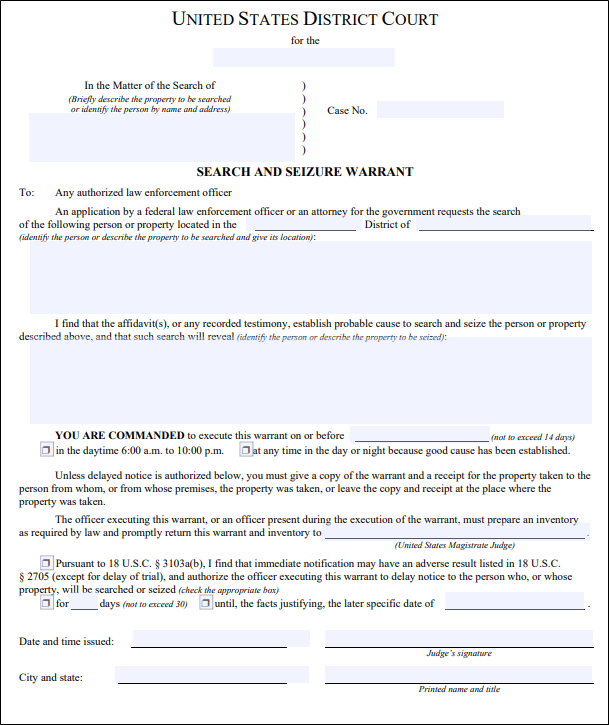
Judicial Warrant for an arrest only:
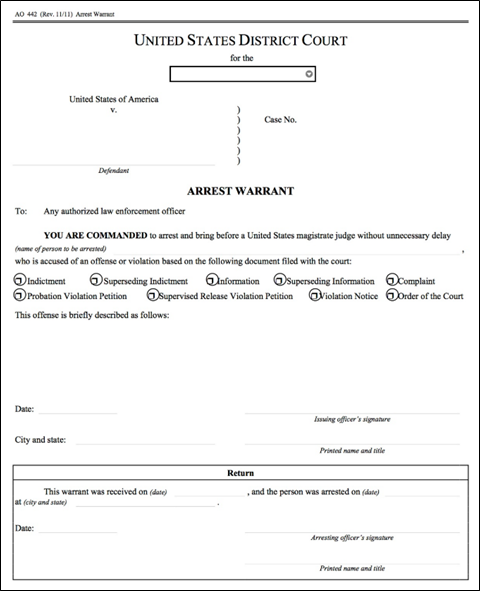
Administrative Warrant (Warrant of Removal/Deportation)
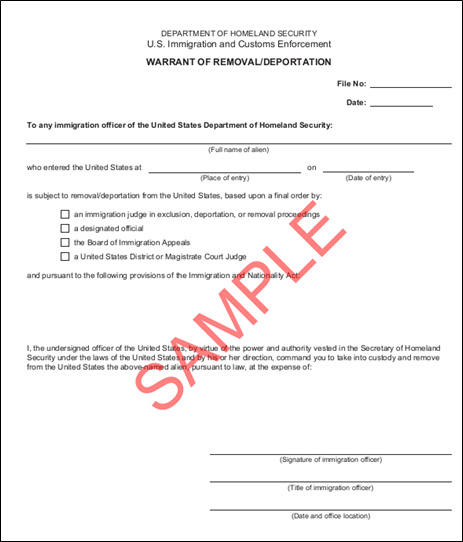
Administrative Warrant (Warrant for Arrest)
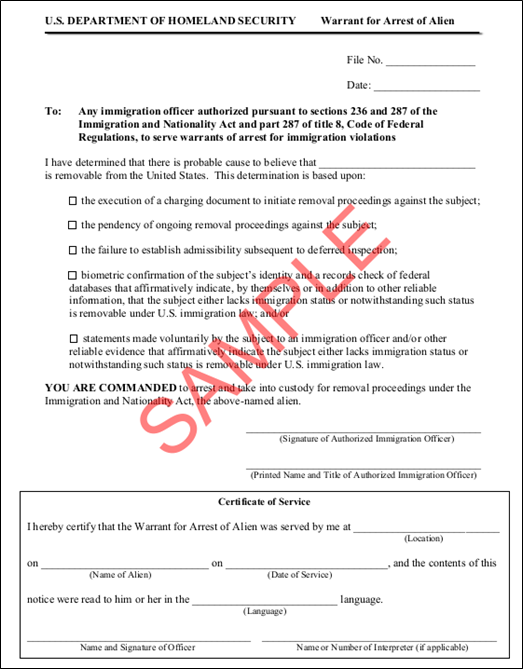






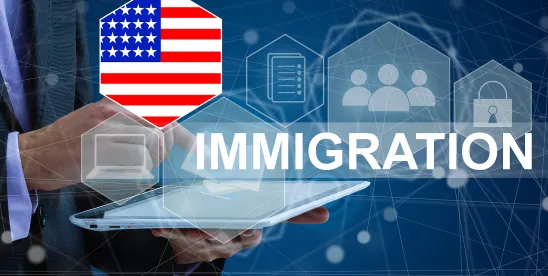
 />i
/>i

